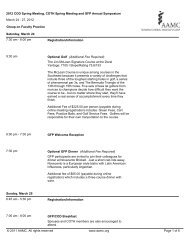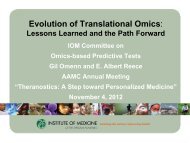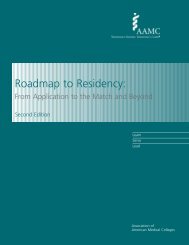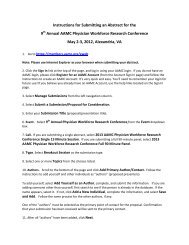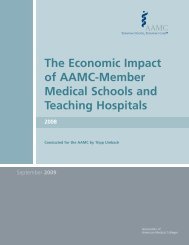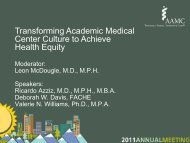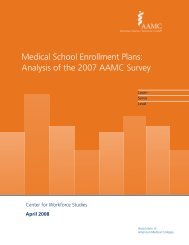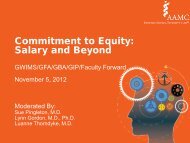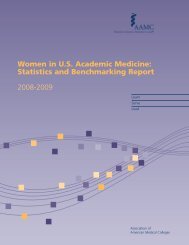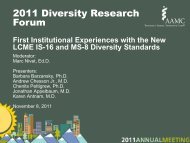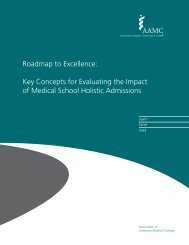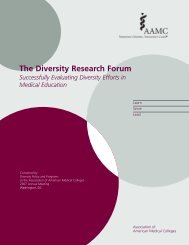Culture and the Courage to Change - Member Profile - AAMC
Culture and the Courage to Change - Member Profile - AAMC
Culture and the Courage to Change - Member Profile - AAMC
Create successful ePaper yourself
Turn your PDF publications into a flip-book with our unique Google optimized e-Paper software.
<strong>Culture</strong> <strong>and</strong> <strong>the</strong> <strong>Courage</strong> <strong>to</strong> <strong>Change</strong>experienced as individual faculty members, we affirmed this culture codeby taking enormous pride in our personal status as independent experts.If this culture of au<strong>to</strong>nomy <strong>and</strong> individual achievement worked so wellfor us, just what is causing <strong>the</strong> negative reactions—ranging from justunder-<strong>the</strong>-surface unease <strong>to</strong> downright disillusionment—that Iencounter so often when I talk with our faculty colleagues?My <strong>the</strong>ory is that we find ourselves in <strong>the</strong> middle of a major cultureclash. As we have grown our institutions—despite constraints in statesupport, NIH funding, <strong>and</strong> clinical reimbursement—we underst<strong>and</strong>ablyhave focused on strategies for generating new revenue while preservingour current structures <strong>and</strong> culture. But I would argue that, in doing so,we have failed <strong>to</strong> see how our changing environment is dem<strong>and</strong>ing thatwe adapt <strong>to</strong> a new, much different culture for academic medicine. Thereality is that, increasingly, <strong>the</strong> world around us is focused less on <strong>the</strong>achievements of individual experts, <strong>and</strong> more on collaboration betweenindividuals <strong>and</strong> groups <strong>to</strong> solve complex problems. The dilemma foracademic medicine may very well be that, while higher education <strong>and</strong>health care have held fast <strong>to</strong> <strong>the</strong>ir traditional individualistic culture, <strong>the</strong>world has fundamentally changed.“The reality is that, increasingly, <strong>the</strong> world aroundus is focused less on <strong>the</strong> achievements of individualexperts, <strong>and</strong> more on collaboration betweenindividuals <strong>and</strong> groups <strong>to</strong> solve complex problems.”The evidence for this change is all around. In research, consider <strong>the</strong> NIHClinical <strong>and</strong> Translational Science Awards <strong>and</strong> o<strong>the</strong>r programs with anemphasis on teams of highly networked scientists <strong>and</strong> <strong>the</strong> open sharingof information. In clinical care, whe<strong>the</strong>r <strong>the</strong> setting is <strong>the</strong> intensive careunit or a newly configured “medical home” delivering primary care, <strong>the</strong>driving concept is that patients want <strong>and</strong> need <strong>the</strong>ir ongoing care providedby a coordinated team, not a series of disconnected consultants. And in7Association of American Medical Colleges



